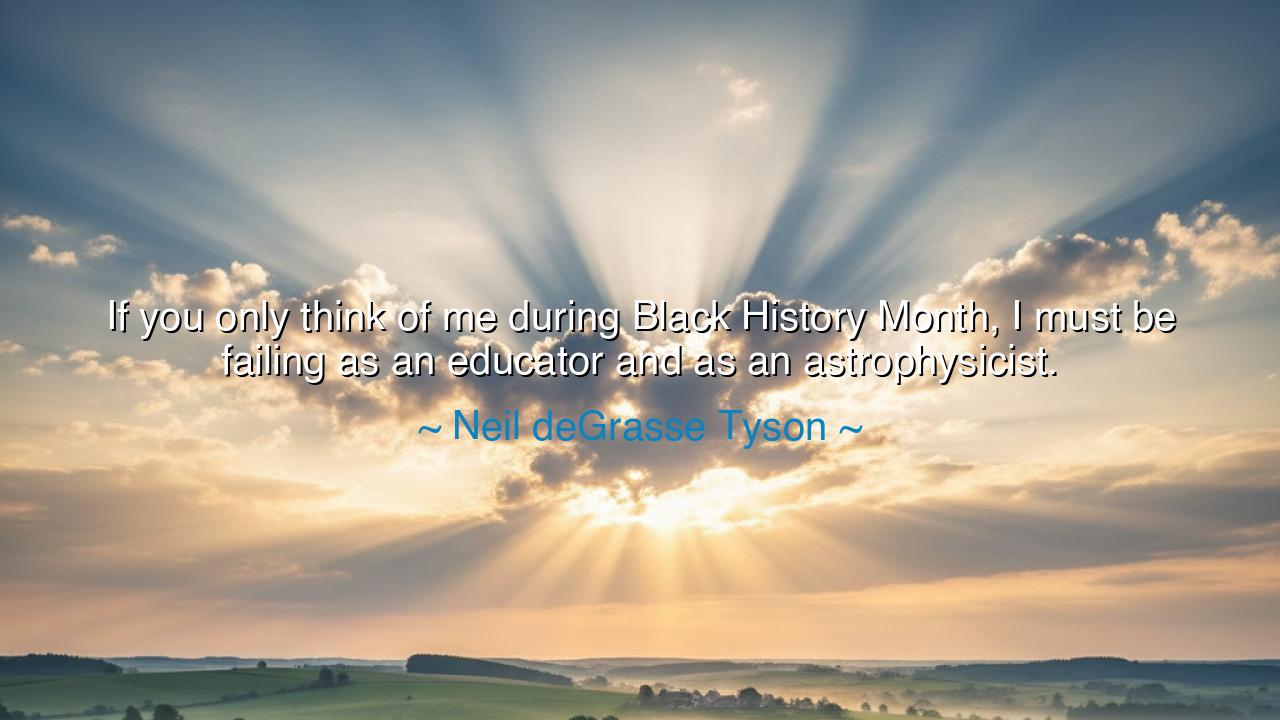
If you only think of me during Black History Month, I must be
If you only think of me during Black History Month, I must be failing as an educator and as an astrophysicist.






When Neil deGrasse Tyson declared, “If you only think of me during Black History Month, I must be failing as an educator and as an astrophysicist,” he was not seeking applause — he was offering a challenge, both to himself and to the world. His words shine with humility, yet they burn with quiet defiance. Beneath them lies a deeper truth about identity, knowledge, and the boundaries we place upon greatness. Tyson’s declaration is not a rejection of Black History Month, but a call to transcend the limits of symbolic remembrance. He yearns for a world in which the brilliance of a mind is celebrated not for its color, but for its contribution to the human story.
In his wisdom, Tyson reminds us that true excellence cannot be confined to a single month, nor to the margins of a calendar meant for recognition. To remember him only as a Black scientist is to half-see him — to look upon a universe of stars and notice only the constellation, not the infinite sky. The origin of this quote rests in his experience as one of the few African American voices in the realm of astrophysics, a field historically dominated by others. Tyson knew that his very presence in that world carried symbolic power. Yet he wished that symbol to dissolve into something higher — that the sight of a Black man studying the stars would one day seem as natural, as unremarkable, as the stars themselves.
For in every age, there are those whose greatness becomes trapped by the mirror of identity. Their achievements, though vast, are reduced to tokens of representation. The world praises them, but often with a whisper of separation: “Look how far one of them has come.” Yet Tyson’s words pierce through this illusion. He demands not tokenism but universality — that his work, his teaching, his wonder at the cosmos, be part of the continuous flame of human curiosity, no different from the light of Galileo, Newton, or Einstein. His quote is, in essence, a plea that knowledge know no race, and that education be a bridge, not a boundary.
Consider, as example, the life of Katherine Johnson, the brilliant mathematician whose calculations guided NASA’s first astronauts safely into orbit. For decades, her genius lay hidden behind walls of prejudice and silence. It was only late in her life that the world began to honor her as a pioneer of both science and equality. Yet Johnson herself never sought fame as a symbol; she sought truth through numbers, through motion, through the eternal logic of the stars. Her story mirrors Tyson’s conviction: that the goal is not to be remembered for breaking barriers, but for expanding human understanding beyond them.
Tyson’s words also teach that representation without integration is not enough. To celebrate diversity only in fragments — a month, a speech, a token gesture — is to confine it to the realm of ceremony rather than reality. True equality is not achieved through remembrance, but through recognition — daily, natural, unforced. When the presence of a Black astrophysicist no longer surprises, when a woman in physics no longer needs defending, when talent and curiosity are the only measures of worth, then the vision Tyson dreams of will have come to pass.
His statement also holds a mirror to all who teach, for it reveals what it means to truly educate. The role of the educator is not to be remembered, but to awaken minds. Tyson does not wish to be a monument, but a messenger — one whose words ignite questions, whose passion for the universe lives on in others. In this, he echoes the wisdom of the ancients, who knew that the greatest teacher is one who frees others to think. If his students or admirers remember him only as a symbol of heritage, and not as a source of intellectual light, then — in his own words — he has failed.
Therefore, O seeker of wisdom, take this teaching into your heart: do not confine greatness to categories, nor honor knowledge only when it fits your rituals of remembrance. Celebrate the human spirit wherever it shines — in the lab, in the classroom, in the night sky. Let Black History Month not be a boundary, but a doorway through which understanding walks freely into every day of the year. Seek to learn from all voices, to see the human before the label, and to let wonder be your compass.
For in the end, Tyson’s message is clear as the stars themselves: when we look to the heavens, no constellation belongs to one people alone. The universe speaks to all who listen. And the true measure of an educator, of a scientist, and of a soul, is not how long they are remembered, but how deeply they help humanity to see.






AAdministratorAdministrator
Welcome, honored guests. Please leave a comment, we will respond soon